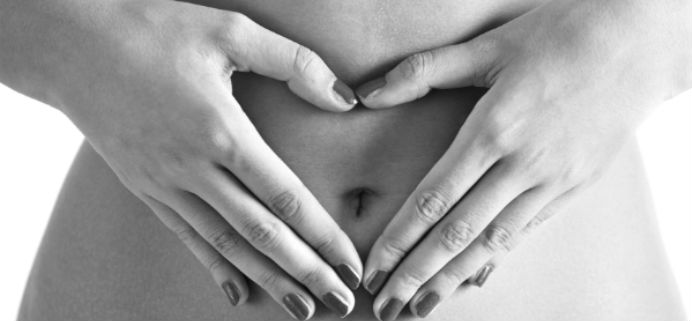Thousands of women each year are effected by cancer – here are the signs to look for of five most common women-only cancers, from consultant gynaecologist at University College London Dr Adeola Olaitan
This September is Gynaecological Cancer Awareness Month, and The Eve Appeal, the UK’s only gynaecological cancer research charity, are encouraging women across the UK to open up about talk about gynaecological health more freely without the fear of embarrassment or being judged.

Endometrial (Womb) cancer
Cancer of the lining of the womb can be called womb cancer, cancer of the uterus or endometrial cancer.
Womb cancer is the fourth most common cancer in women in the UK and is on the increase each year due to changes in our lifestyles. Over 8,400 women are diagnosed every year in the UK. Age-specific incidence rates rise sharply from around age 40, peak in the 70-74 age group, and subsequently decline steadily.
Womb cancer is almost always curable if caught at an early stage so it is important for women to be aware of what to look for.
The key early signs and symptoms of womb cancer are:
- vaginal bleeding after the menopause
- vaginal bleeding between periods
If you have any abnormal bleeding, tell your GP straight away. If this abnormal bleeding continues or worsens then return to your GP and explain this to them. It is unlikely that your symptoms are caused by a serious problem but it is important to be checked out.
To protect yourself, you should aim to maintain the ideal body weight for your height by eating a healthy diet and taking regular exercise.
If you have any abnormal bleeding, tell your GP straight away.
Ovarian cancer
Ovarian cancer is the fifth most common cause of cancer death in women and accounts for more UK deaths than all of the other gynaecological cancers put together. Over 7,000 women are diagnosed with ovarian cancer every year in the UK and 4,200 will die.
Ovarian cancer becomes more common with increasing age. Three quarters of new ovarian cancer cases in the UK are diagnosed in women aged 55 and over.
The good news is that if diagnosed at an early stage, the outcome is good. However, because some of the symptoms of ovarian cancer are similar to those seen in more common conditions, it can be difficult to diagnose, with most women diagnosed when it is too late and the disease has already spread.
The key early signs and symptoms of ovarian cancer are:
- persistent pelvic and abdominal pain
- increased abdominal size/persistent bloating – not bloating that comes and goes
- difficulty eating and feeling full quickly
- urinary symptoms – needing to pass water more often than usual
However, if any of the above symptoms occur frequently i.e. more than 12 times a month, this can suggest a diagnosis of ovarian cancer. Occasionally there can be other symptoms such as:
- Constantly feeling tired
- Unexplained weight loss
- Changes in bowel habit
If you regularly experience any of the above symptoms, which are not normal for you, it is important that you see your GP
Cervical cancer
Cervical cancer is cancer of the cervix (also known as the neck of the womb) which connects a woman’s womb and her vagina.
Cervical cancer can affect women of all ages but is most common in women between 30 – 45 years of age. It is very rare in women under 25 years of age. Cervical cancer is a largely preventable disease. In the UK we have a very successful cervical screening programme which is estimated to save over 4,000 lives each year.
In the UK we have a very successful cervical screening programme which is estimated to save over 4,000 lives each year
Cervical cancer incidence is related to age, but does not follow the pattern of increasing incidence with age seen for most cancers. There are two peaks in the age-specific incidence rates: the first in women aged 30-34 (at 20 per 100,000 women) and the second in women aged 80-84 (at 13 per 100,000 women). The earlier peak is related to many women becoming sexually active in their late teens/early 20s.
The earlier cervical cancer is diagnosed, the better the outcome will be, so it is important to know the signs and symptoms.
The key early signs and symptoms of cervical cancer are:
- any unusual bleeding from the vagina particularly
- after sex
- after menopause when your periods have stopped
- persistent vaginal discharge that is blood stained or smells unpleasant
Vulval cancer
Cancer of the vulva (also called vulval cancer or vulvar cancer) is one of the rarer cancers with just over 1,000 cases diagnosed in the UK each year. Around 80% of vulval cancers are diagnosed in women over 60, but the non-invasive precancerous condition vulval intraepithelial neoplasia (VIN) which is the stage before a cancer has developed, tends to be diagnosed earlier i.e. 30s – 50s.
Vulval cancer incidence is strongly related to age, with the highest incidence rates being in older women. In the UK between 2009 and 2011, an average of 46% of cases were diagnosed in women aged 75 years and over, and nearly three quarters (73%) were in those aged 60 years and over.
Signs and symptoms of cancer of the vulva can include:
- a lasting itch
- pain or soreness
- thickened, raised, red, white or dark patches on the skin of the vulva
- an open sore or growth visible on the skin
- burning pain when you pass urine
- vaginal discharge or bleeding
- a mole on the vulva that changes shape or colour
- a lump or swelling in the vulva
In order to protect yourself, do not smoke – as it can increase the risk of vulval cancer. Additionally, ensure that you report any itching, pain or skin rash immediately to your GP – please do not assume it is thrush and self-diagnose as all these symptoms can be caused by other more common conditions, such as infections.
Vaginal cancer
Vaginal cancer is a very rare disease with just over 250 cases diagnosed in the UK each year. It is most commonly diagnosed in women over 60 years of age and is extremely rare in women under 40.
Changes to the cells in the lining of the vagina called Vaginal Intraepithelial Neoplasia (VAIN) can mean you are more at risk of getting vaginal cancer. These changes are not enough to make the cells cancerous, but they could become cancerous if not treated.
Although not designed to do so, having regular cervical screening tests (smears) can help pick up cell changes involved in vaginal cancer in its very early stages, but cervical screening is not guaranteed to pick up these conditions, because they mainly take cells from the cervix, rather than the vagina.
The early signs and symptoms of vaginal cancer or the pre-cancerous changes called Vaginal Intraepithelial Neoplasia (VAIN) are rare. They include:
- Bleeding when you are not having a period or bleeding after the menopause – this is the
most common symptom. You may have bleeding after sex. - Vaginal discharge that smells or is blood stained – about 3 out of 10 women (30%) have this symptom
- Pain during sexual intercourse
- A lump or growth in the vagina that you or your doctor can feel – up to 1 in 10 women (10%) have this
- A vaginal itch that won’t go away
However, as many as 20 per cent of women diagnosed with vaginal cancer have no symptoms at all and is very similar in terms of signs and symptoms as vulval cancer.
To find out more information about gynaecological cancer or Gynaecological Cancer Awareness Month please visit eveappeal.org.uk/gcam
Like this article? Sign up to our newsletter to get more articles like this delivered straight to your inbox.

























































